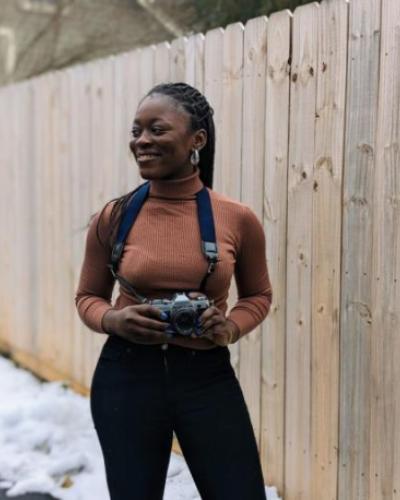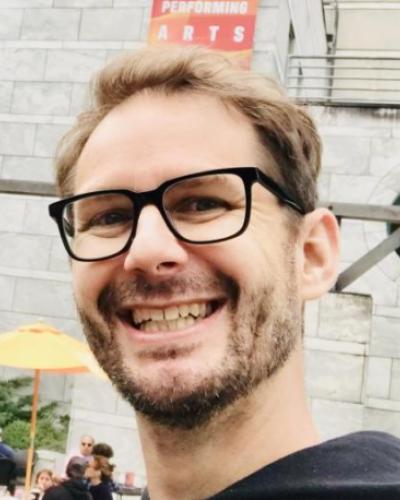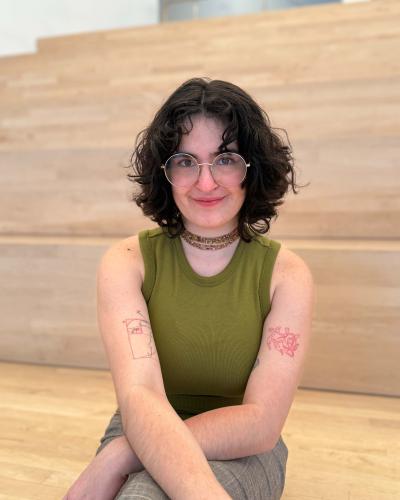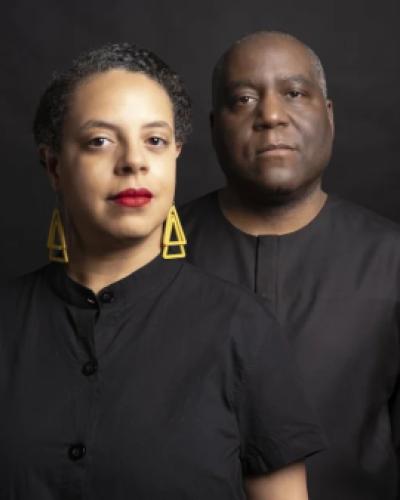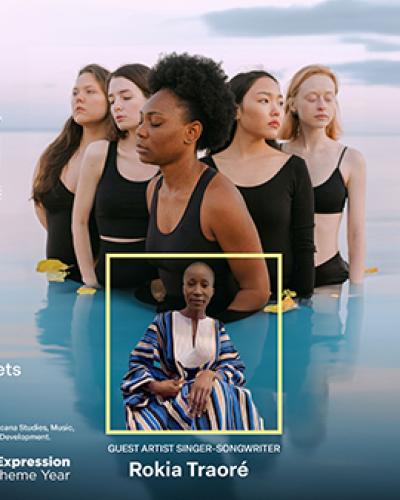In this episode, Leah Ingalls, a junior in PMA major, and Chris Christensen, IT Support, meet with Associate Professor Beth F. Milles, as well as Associate Professor and Interim Chair Samantha N. Sheppard, to discuss the upcoming production of DESDEMONA. The Department of Performing and Media Arts is thrilled to present Toni Morrison's 2011 work DESDEMONA to honor the 30th anniversary of her Nobel Prize, which will include the music and performance of critically acclaimed Malian singer-songwriter Rokia Traoré. Click HERE to learn more about DESDEMONA.
Click HERE to see more episodes.
Transcript
Beth F. Milles 0:00
Coming to see Desdemona will offer the audience an incredibly rare opportunity to hear and see the music of Rokia Traoré live. Rokia’s voice is so heart achingly, spiritually poignant, and it's transformative as the piece inherently is asking for transformation, requesting and requiring transformation, and the music Rokia has written and then performs for this piece is an indirect conversation with the work and the stories of the characters and Othello.
Chris Christensen 0:44
Hello, and welcome to episode 48 of the PMA Podcast. In this episode, Leah and Chris met with Associate Professor Beth Milles, as well as Associate Professor and Interim Chair Samantha Sheppard, to discuss the upcoming production of Desdemona. The Department of Performing and Media Arts is thrilled to present Toni Morrison's 2011 work Desdemona to honor the 30th anniversary of her Nobel Prize, which will include the music and performance of critically acclaimed Malian performer Rokia Traoré.
Chris Christensen 1:14
Beth, Samantha, thank you for joining us today. Beth, this is your second time on the podcast. It's been a while.
Beth F. Milles 1:22
Yeah, I'm thrilled to be back.
Chris Christensen 1:25
Thrilled to have you here. I can't even, what was the play we were talking about last time?
Beth F. Milles 1:27
It was Brecht.
Chris Christensen 1:29
Wow. It was years ago. Excellent. And Samantha, first time on the podcast as well.
Samantha Noelle Sheppard 1:34
Yes, first time caller longtime fan.
Chris Christensen 1:37
Love it. Love it. So Leah is joining us once again, on the podcast. Welcome back.
Leah Ingalls 1:44
Hello, thank you.
Chris Christensen 1:46
Yeah, second podcast.
Leah Ingalls 1:47
Yes. Exciting.
Chris Christensen 1:48
And today we're talking about Desdemona. Beth, do you want to tell us a little bit?
Beth F. Milles 1:53
Okay. We're very honored to have the opportunity to stage Toni Morrison, Nobel Prize winning Cornell alum, Toni Morrison's 2011 play Desdemona which is a response piece to Shakespeare's Othello, but it’s a jumping off point. Toni Morrison wrote a lyrically beautiful response to Othello in partnership with Malian singer and songwriter Rokia Traoré and we were invited to present this to honor the 30th anniversary of Toni Morrison's Nobel Prize.
Chris Christensen 2:27
All right, all right. What do we know about the play itself in terms of when, when does the play open?
Beth F. Milles 2:34
The play opens October 27th. It runs that weekend, October 27th, and 28th in the Schwartz Center for the Performing Arts.
Chris Christensen 2:41
Two days only.
Beth F. Milles 2:42
Two days only.
Chris Christensen 2:43
Okay, so if we want to get tickets pma.cornell.edu. I think if we look carefully, there's a calendar there and you can get your tickets which are free, by the way, we are not charging for this particular event, or any event for that matter.
Beth F. Milles 2:57
We want to welcome people to the Schwartz Center.
Chris Christensen 3:00
Yes. Any questions, Leah?
Leah Ingalls 3:02
I was wondering if you could tell us a little bit about the artist Rokia Traoré and her involvement in this?
Beth F. Milles 3:07
Rokia Traoré is an internationally known renowned singer and songwriter, an activist, speaker for civic justice, a feminist ambassador, and a brilliant musician. And in the original production that Toni Morrison created in partnership with the director Peter Sellars, they invited Rokia Traoré to enact the role of Barbary who was a lesser-known character in the original Othello, but to create an original score that was based in her African heritage using music that would interweave against the text that Morrison created.
Leah Ingalls 3:26
Beautiful.
Chris Christensen 3:47
Samantha, is there anything in particular that you wanted to speak to?
Samantha Noelle Sheppard 3:52
No, I mean, I wanted to just, sorry, there's a little bit of noise. I just wanted to really celebrate the fact that this is a collaboration that, that goes across the college and the university as an event that is a part of President Pollock's freedom of expression year theme. This also is being done with the Toni Morrison Working Group and in collaborative forces, across campus and in various departments. And so we're really excited that PMA is, is putting on this play, but also is becoming a central loci, a local, a focal point really, for interdisciplinary conversation around the arts, and particularly around Toni Morrison's indelible plays in the sort of American cultural sphere. So it's just a really, really exciting time for the department. It's a really exciting time to have a project like this being launched. And of course, just a really exciting time to see the kinds of collaboration across campus to make a work like this come, come bear fruit in the department.
Chris Christensen 5:18
Okay, thank you so much. Appreciate that.
Leah Ingalls 5:22
Right. So, in that, Professor Sheppard, I heard you mention that this is a part of several broader celebrations of freedom of expression. And I believe also of Toni Morrison's work. I was wondering if you could share a bit about how this is connected to the Toni Morrison Collective and a sort of broader way, array of events on campus?
Samantha Noelle Sheppard 5:47
Yeah, absolutely. So one of the great things is that in getting this project to launch it required, it required a lot of, a lot of support, financial and, you know, just conceptual support from so many stakeholders. And so we have many co-sponsors for this event, including the Office of the Provost, our own department, Africana Studies, the music department, literatures in English, American Studies, Romance Studies, the Institute for African Develop, the project was awarded a Humanities Impact Grant and a grant from Cornell Council for the Arts. And the Toni Morrison Collective, particularly spearheaded by Anne Adams, played a central role in really offering up this opportunity to think about Toni Morrison's plays, which often don't get as much focus and attention, as of course, her literary work and her activism and her cultural impact. And so, all of these stakeholders really came together under the auspice of the Toni Morrison collective, to work with PMA and to work particularly with Professor Milles, on helping to bring this work and particularly being able to bring Rokia with, into the project in order for our students to have a deeper and really sort of more transformative experience engaging with this transformative work. And so, as part of the Toni Morrison Collective, we have this work, but we also have other events that are surrounding celebrating Toni Morrison's Nobel, Nobel, Nobel Prize. And so related to the play, we also have the film screening of Toni Morrison, the documentary Toni Morrison, The Pieces I Am that will be screening on October 16th at 5:30pm at Cornell Cinema, which will be introduced by PMA Professor Mendi Obadike, and her partner Keith Obadike who's in AAP. So we also have that event happening, and other connective tissue events around Toni Morrison including a Toni Morrison lecture that will be happening out of the Africana Department. And again, these things are all started off initially as ideas that, that arose from the Toni Morrison collective, looking to see again how across campus, we could have share stakeholders trying to imagine the, the relevancy, which we of course know how absolutely relevant Toni Morrison's work is, but the relevancy of her work to this modern moment. And so we just feel really, really lucky to be in conversation with the collective but of course have an opportunity in PMA to do the kinds of special work that we can only do here.
Chris Christensen 8:30
Wow, thank you so much. We want to take a step back and talk about Rokia specifically. Beth, can you tell us a little bit about Rokia’s involvement? What, what the band's looking like, what the musical aspect is going to entail?
Beth F. Milles 8:45
Sure, as Professor Sheppard said PMA was reached directly to by the Toni Morrison collective, both Roger Gilbert and Anne Adams had reached out to us, and we began a conversation to explore this work. The work premiered in 2011 and ran few productions internationally in Vienna, in Paris, in Berlin. There was a production in Berkeley, but each time it ran only once or twice, but it became clear how integral and central the voice of Rokia Traoré was to this work. And there's many aspects to respond to about who Rokia is in the piece and why we thought she was essential to our version. It felt to celebrate Toni Morrison, and to create a platform to engage in this work, the most ideal situation would be the opportunity to invite Rokia which seemed like an impossibility. I mean, honestly, it seemed like it was a complete impossibility. But in a place such as Cornell, we thought it was also a necessity. And so we began a longer journey to invite and try to create a way that Rokia and her collaborators could come to Cornell to sing the music she created for the song and play and enact the role. One of the things that I wanted to say is, she's a storyteller. The character that Rokia plays in the tradition of her music is interrelated with the griot tradition of storytelling. And this piece is telling a story. The person who didn't get to speak her story is speaking the story, Desdemona. In our production, we've re-envisioned it to seven undergraduate students playing this role speaking together as women telling the story in partnership with Rokia Traoré, and Rokia is coming to, I guess the word is re-imagine and reignite the music in our world now. As Rokia would be the first to admit, we live in a different world. It's, it was created before 2011, and it's now 2023. One of the interesting things about this piece is that it's created in the afterlife. And so one of the most poignant aspects of this is now it's in the afterlife of Toni Morrison as well, because she passed away in 2019. So every way we're approaching the music, Rokia’s work and the interrelationship of the storytelling with the students is suffused with that. Rokia is traveling with musicians she works with in Mali, and they're rehearsing right now, and she is re-orchestrating the music because it had been done slightly differently, as you can imagine, on tour. But, so some of that is in process right now of development. She's sending us rehearsal pieces, but some of it is in the original instrumentation. And they will be traveling with some instruments and some we will be locating here locally.
Chris Christensen 11:42
Okay. One of the things I wanted to point out is that you are listed as facilitating the play as opposed to directing, you want to talk a little bit about that?
Beth F. Milles 11:51
I'm a collaborative maker of theater. I am a director, that is my training and what I teach and what I do. For this project, it felt very important to create a platform for people whose voices are not heard. This is what the play is about. And so I'm working collaboratively with the students, but I see this as a facilitation of a very large, as Samantha said, interdisciplinary, multidisciplinary work. And so they'll be visual elements, projections, live music, like a concert with this incredible musician. It's a rare opportunity to see Rokia perform, and the beautiful, complicated, intricate language of Toni Morrison.
Chris Christensen 12:37
Okay, thank you.
Leah Ingalls 12:38
Incredible. I think it sounds like we are incredibly fortunate to have Rokia and to have this being put on here, here at the Schwartz Center. So as we're starting to get into the content of the show itself, I was wondering if you could speak a little bit to the content warnings that the show might entail.
Beth F. Milles 12:58
For those who know the story of Othello, the Shakespeare version of it, there's some inherent racism in the play. And in addition, acts of physical violence, domestic violence. As this story is told, it's told in the form of poetry in the form of presentationalism, it's not enacted. But there, there is a process that we all go through, which is like a reckoning. I think in hearing this language. It's a live, spiritual reckoning of the stories of women, mostly the women who appear in this piece as voices are the women who didn't live through the play Othello. But Othello also plays a major role.
Chris Christensen 13:45
Can you talk a little bit about what the stage is going to look like? Do you want to give away too much or, or hold that a little closer?
Beth F. Milles 13:51
I call it a space for possibility.
Chris Christensen 13:54
Okay.
Beth F. Milles 13:55
It's an open space. But the inspiration is a concert reading. But the environment, the natural environment will play a large role.
Chris Christensen 14:05
Oh, okay.
Beth F. Milles 14:06
We have a beautiful, if you've never been to the Schwartz Center, we have such a beautiful facility, and incredible craftsmen, artists and technicians who create our work. And this is also an opportunity to show and share this work with the public.
Chris Christensen 14:21
What about costume design?
Beth F. Milles 14:24
Similarly, as it takes place in the afterlife, and the characters are voicing many different characters. The inspiration was to create a palette for many of the different characters they play. And in that case, projection, and the imagery we create technically will create a role interacting with these costumes.
Chris Christensen 14:45
Okay.
Leah Ingalls 14:46
That's incredible. It's my understanding that introducing this projection element to it, it, that would be a new element of this performance? As, as opposed to previous performances?
Beth F. Milles 14:59
Well, I do think projection has played a role in the layering of supertitles. None of Rokia’s music is performed in English. And although we are not planning and do not wish to translate as that doesn't seem right, we do want to give an idea about the songs and to locate the character. So I think the idea of how we access information, what we believe, how we synthesize it, and what we know, is at play in utilizing projection.
Chris Christensen 15:29
Okay. I guess I'll ask this question to both Beth and Samantha, what are your hopes and takeaways for the audience, when they come to experience this in just a couple of weeks?
Samantha Noelle Sheppard 15:40
I mean, I think, I mean, obviously, whenever we put on any work, I really do hope that, that we have an audience who is that wonderful mix of entertained and engaged. Entertained, because it really is something it's, it's going to be really a beautiful, beautiful work that is also a real, real, a real labor of love and work. We have, we have great work that we're putting on stage, we have great collaborations happening on stage, but also behind the scenes to put the work on. So I really do hope that audiences walk away feeling like they really sort of saw a, you know, a premiere program. And at the same time, I really do hope that our audience will engage with these issues. It's, it's a tough text. And in part because of its reinterpretation of a well-known work, because of the way that it's trying to deal with, with race, really in a, in a much more sort of global context. And issues of feminism, issues of grief, issues of love, issues of relationships. So I hope that, I hope that audience walk away feeling sort of deeply called into a place of reflection, to think about that sort of the legacy of the lineage of, of not just Morrison's work, but also of the work that we encounter every day and chances to see it anew. And to think critically about, about life, and about grief and about longing. And about really the struggles of identity, particularly in a way that I think that that they haven't been able to without, without the opportunity of a work like this. And of course, I really do hope that this, this recenters conversations around, you know, where you can see amazing work on campus that you can come to the Schwartz Center. And you can also be a part of really great work, if you bring yourself to the Schwartz Center and work with our wonderful colleagues who are, who are trained to be able to, to mount work like this and to be a student in classes where you can learn more deeply about work like this. And so I really just hope that the audience walks away with the two main needs, you know, entertainment and engagement. And, and yeah. What would you say to that?
Chris Christensen 18:10
Beth, anything to add?
Beth F. Milles 18:11
A couple, and then I want to, I want to jump back and say something about the creation of this work?
Chris Christensen 18:15
Sure.
Beth F. Milles 18:16
But I'll answer that one for the one that you just asked. So I love what Professor Sheppard said, I think that theatre creates an area for contemplation, for reckoning, for conversation. It doesn't solve problems, it asks questions. And this is such a lovely work to have the opportunity to reckon with in this moment. One of the greatest experiences of it right now is to get to work with seven undergraduate students I've never worked with before and watch all of us come to an understanding of what might be asked of us as we're creating this piece. And as the students who were drawn to this project were drawn to take a class about the play, and then were cast in the project. So the play is contextualized and situated inside of a class, a larger class about Desdemona and the work of Toni Morrison. I also wanted to say that I had the opportunity to run a Nexus research group this summer that was focused on the work of Toni Morrison and with three undergraduates, we researched this work for the summer and ended up in the Toni Morrison archive in Princeton. It was so inspirational, to come to understand the magnificence and scale of Toni Morrison's voice, her poetry, her literature, her essays, her standing up, her ability to dive into uncomfortable places. So that really informed our process moving into Desdemona, and those students are still involved in this work in differing ways. So I think it's a very human piece. And I hope that even people who've never been before will come back and see other conversations that could happen in the space. There's a large size in a theater, but it also provides great interactive intimacy. The intimacy of the stories we may not want to hear but have to, or the stories we come to hear and are surprised to feel involved with.
Chris Christensen 20:26
Was there something, you said there was something else you wanted to say too?
Beth F. Milles 20:30
Yeah, the origin of this piece. Desdemona came from an argument, it's written all over if you research it at the outset, between the director Peter Sellars, who was the original director of this piece, and Toni Morrison about the validity of this play Othello, and they were talking about whether because so many interpretations rightly call out an inherent racism in the play, how Othello is created, and how his actions create an ability to reject him out of hand. And this is one of the trickier areas of this piece, so I enter this a little bit gently. But underneath the telling of Desdemona is the potentiality for forgiveness, and understanding and part of why Rokia was brought in, is because Toni Morrison felt compelled to investigate the story of where has Othello come from? How did he come to become a general? Who is he? And whether we feel on the outset or from the outside, we could forgive, Toni Morrison is postulating it.
Chris Christensen 21:42
Thank you Beth. Is there anything that we didn't ask yet today that you really would like to talk about? Open to both Samantha and Beth.
Beth F. Milles 21:52
Samantha, did I miss something?
Samantha Noelle Sheppard 21:54
No, I mean, you've done such a great job of working through the stakes of the project, and also all of the, the forms of collaboration and the roots of, of the work for Morrison, but also the roots of the work in house in terms of how it's come about and how it's developed as a part of the part of the class experience. I know that we're really, we're really hoping that that we can obviously have a full house for, have a full house for both of these productions. But, but I really would encourage, I really would encourage students to, to get a ticket, as you said, they're free and to bring a friend for the production because I really do think that this is a really game changing work and a really game changing production that really requires you to be there and to witness it. And that's why it's almost a little even difficult at times to describe, because so many of these inter art elements are necessary to tell this story. And we're already taking it into a multimedia dimension. But the music is going to play such a significant role. And you have to, you have to experience that and let, you know, the notes, and the melodies, and the words, the things that you can't describe and, and the affective dimensions that make music so meaningful, really wash over you. So I've just, I really want to encourage everyone to come out, to come see this work, to have yourself experience it. And to also, to see your fellow, to see your fellow classmates onstage with, with a world class performer. We really just don't get opportunities like this very often. So I really want to encourage everyone to take this opportunity. Come to the Schwartz, come see the show. And then of course come talk about it. Come talk to us about it. We want to hear what you thought.
Chris Christensen 23:48
Okay, thank you so much, Samantha. Appreciate it.
Beth F. Milles 23:52
In addition to this event, Ford Morrison, the son of Toni Morrison will be coming to Cornell to attend the production. And we are planning a post-show conversation between Ford and Rokia Traoré about Toni Morrison after the second performance, so it's a rare opportunity. And we are hoping people will come to engage. We will also create other events around campus this semester to talk about the work of Toni Morrison. Another satellite event, one of the Nexus scholars, who's a music student, Alice Roberts, is hosting a concert with the music department and Barnes Hall on October 21st. And that is I think at three o'clock, but we will post it on our website. It's a concert that will include music that, lyrics that Morrison has written the music to, not from this piece, just in support of this event.
Chris Christensen 24:44
Okay. Well, thank you both so much for joining us today in the podcast. And we look forward to seeing Desdemona when it opens.
Leah Ingalls 24:54
Absolutely.
Beth F. Milles 24:55
Thank you. We're very excited.
Chris Christensen 24:57
Thanks again, Samantha.
Leah Ingalls 24:59
Thank you.
Samantha Noelle Sheppard 25:00
Thank you both. Have a great day.
Chris Christensen and Leah Ingalls 25:01
You too.

